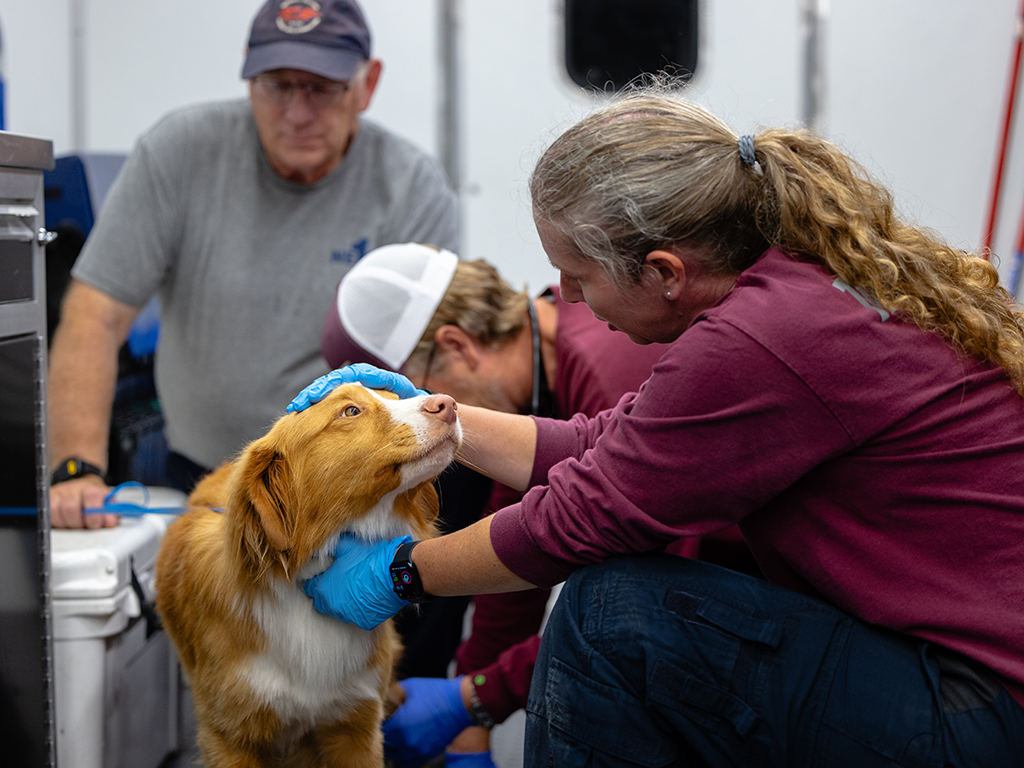New Study Reveals Owner Demographics Influence Canine Nutrition
Story by Courtney Price, VMBS Marketing & Communications

Dog owners have quite a bit of control over their pets’ diets, and many have strong opinions on what kinds of diets are best for their canine friends.
But a new study from the Dog Aging Project (DAP) at Texas A&M University and investigators at Virginia-Maryland College of Veterinary Medicine has revealed that the reasons owners choose certain diets for their dogs can vary widely, with owner age making a bigger difference than income or education level.
The DAP is a collaborative, community scientist-driven research project that enrolls companion dogs from all backgrounds across the United States in order to study the effects of aging and gain a better understanding of what contributes to a long and healthy canine life. Many of its research projects have led to studies that inform not only dog health but also human health, and today there are more than 50,000 dogs enrolled in the program.
In a recent study published in the Journal of the American Veterinary Medical Association, DAP researchers collected information from more than 40,000 dog owners regarding their income, education, age, and whether they live in an urban, suburban, or rural environment. This was in addition to previously collected dog demographic information, including breed, size, age, diet, and whether each dog saw a veterinarian for annual wellness exams.
“We found that owner demographics play a much more important role in the selection of dog diets than previously thought,” said Dr. Katie Tolbert, a board-certified veterinary nutritionist, internist, and associate professor in the Texas A&M College of Veterinary Medicine & Biomedical Sciences’ Department of Small Animal Clinical Sciences.
“Sometimes we do studies related to dog demographic factors — like breed, size, and age — that we think influence the diets that owners feed their dogs,” Tolbert said. “But if we don’t consider the owner’s demographic factors, we might not be looking at a complete picture.
“For example, we found that older pets are more likely than younger animals to be fed a canned or home-cooked diet,” she said. “Without considering the owner, we might assume that this choice is a result of dog age. But now we have data suggesting that it might be that older dogs are more likely to have older owners, and they are making decisions based on what they believe are healthier choices for their dog that have nothing to do with the dog’s age.”
In another example, the team found that some owners may make choices about dog diets based on dog lifestyle as well as geographic location.
“For example, although the majority of dogs are fed a kibble diet regardless of dog size or geographic location, we found that highly active dogs, working dogs, and those living in rural environments were more likely to be fed home-prepared raw or cooked diets when fed something other than kibble,” Tolbert said. “In contrast, sedentary dogs and dogs living in urban areas were more likely to be fed canned, commercial raw, or home-cooked diets when fed something other than kibble.
“The point of this study was to show that we need to consider information about both the dog and their owner when assessing why a dog is fed a particular diet,” she said. “This will make sure that we continue to support canine health with the most accurate information possible.”
The DAP is currently enrolling pet dogs — including young and old, mixed breed and purebred, healthy and those with chronic illness — from all fifty US states. For more information, or to enroll your dog, visit dogagingproject.com.
###
For more information about the Texas A&M College of Veterinary Medicine & Biomedical Sciences, please visit our website at vetmed.tamu.edu or join us on Facebook, Instagram, and Twitter.
Contact Information: Jennifer Gauntt, Director of VMBS Communications, Texas A&M College of Veterinary Medicine & Biomedical Sciences, jgauntt@cvm.tamu.edu, 979-862-4216
You May Also Like








